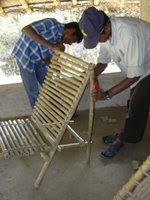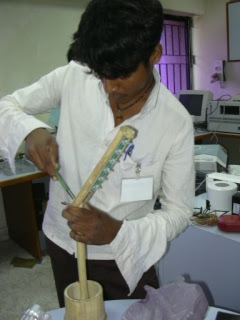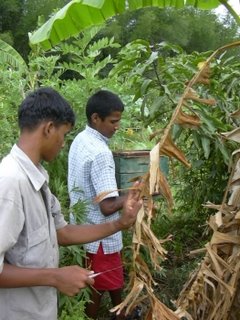
Excerpts from Newsletters that pertain to Life Skills training in Thulir
From News Update April to August 2008
The Class 10 exams in March
All the students who attended Thulir regularly and wrote the class x public exams in March passed. As this has happened for the 3rd consecutive year, Thulir has earned a reputation among the locals. This has been both good and bad for us. Good, as parents who thought our methods were not good as we didnt hit the children and therefore didnt expect us to succeed, have begun to change their opinions and trust our teaching abilities. Its bad as a lot of children who have never been part of Thulir sessions now come to Thulir just before the exams and want to be coached. A couple of them even came the day before the exam as they thought it would bring them good luck and help them pass! One of the parents wanted to take her daughter off the Govt School 10th class and send her to Thulir full time for coaching!
We have now made it clear to the Villagers that only those children who come regularly to Thulir and have attended at least for 2 years before they appear for their exams would be helped. We have had to do this as for most children even their basic reading/ writing skill levels are poor and so it is an uphill task to get them to a level of being able to write their 10th exams.
Going Back to school / higher studies!
There is a big wave this year among the youngsters in the villages here to continue schooling and to go out for higher studies. While this used to happen with just a few students till now every year, this year most students who passed their 10th [even the ones who finished after many supplementaries] have joined class 11 in schools outside the area, many of them joining hostels to do so. All these years most young people used to migrate outside to work [mainly in the garment industry, but this year it has been for studying.
While this looks like a good thing as young people get a few more years of student life away from grueling work, the quality of education they are pursuing is poor. They often go to Govt run schools [with hardly any teachers] or to dubious private institutions that have mushroomed all around. Once the students go outside their village for higher studies, the expenses incurred on education goes up steeply and in the village there is no understanding of what quality in education means and what are the likely benefits of higher education [save for a vague promise of Govt. jobs!].
There is aggressive promotion by private educational institutions
and parents and students are being lured by promises of impossible
dreams into spending large sums of money. While on the one hand we
want Thulir children to acquire good academic skills and do well, on
the other hand we have had to try to talk to them and their parents
about the dangers of the present trends. But this has been an uphill
task for us and a source for great frustration
From Updates of January to March 2008
Class X public exams
The Tamilnadu government class X exams for private candidates were held in September. Six of our students wrote one or two subjects each and four passed. We have a group of 11 students (including 6 girls) coming during the day to study and write X exams. All these students come to us only months before their exams and this whole exercise is a source of dilemma and frustration for us. First, none of them have been taught the basics in any of the subjects. They have been taught only to memorize facts in their school without any understanding. We believe in learning and not memorizing. So it is a frustrating exercise.
We compromise by selecting a few topics from each subject and teaching them completely.
Before the exams, they have to go to Harur (a day’s work) to pay the exam fees and again to collect the hall tickets (two days before the exams). Two whole days and about Rs 200 are spent in this travel alone. They are also allotted exam centres only in Harur or Dharmapuri. So they either have to go there the previous day and find someone to stay with or risk the bus-service on the day of the exam. During the last exams, the bus didn’t come on the morning of the English exam and the girls hitched rides and bus-hopped and reached the exam hall 45 minutes late!
When one sees the enormous hardships these students undergo just to write these exams and the poor academic skills and recognition they gain at the end of it one wonders if the whole exercise is worth it!
Other inputs for the class X dropout – students
Realizing the importance of “hand-on”skills, we taught this group basic - electronics, soap- and paper making, embroidery, organic farming, bamboo crafts etc..
We also had many discussions on the social and personal issues that confront them. Effects of the media (TV, cinema), suicides, alcoholism, infatuations and romances, real education, etc. were some of the issues we discussed with them at length. Initially most of them were silent, but with time there is an increase in their participation. Schooled into “not thinking, just receiving mode’, they have just started realizing the importance of “thinking” about some of these issues.
Senthil and Perumal have been teaching this group the skills they have learnt. The girls too make good LED torches now! There is a great demand for our bamboo torches outside Sittilingi and for our plastic torches inside Sittilingi!
Rajendranath Setty, a class X student of Rishi Valley school, visited us in November and taught them to weave wrist bands of thread. These friendship bands are very popular among both boys and girls! Our village children used to buy them earlier from outside. Now they make various designs in Thulir, thanks to Raj.
Positive Developments
–Basic Technology course:
The first batch of Basic Technology course has completed the course. 2 of the boys Balu and Maadhu have gained enough confidence to go back to school to attempt class 10 exams. We feel this is an indication of their increased self confidence. Mohan is well after his heart surgery [Thanks to generous support from friends of Thulir] and he too is preparing to write his 10th exams. Senthil and Perumal have joined Thulir as Fellows on an enhanced stipend of Rs. 1000 per month. They will explore possibilities of enhancing their skills and facilitate some hands on workshop exercises for the younger children.
—-Senthil and Perumals’s continuing journey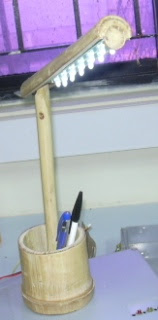
Senthil and Perumal from the first batch of Basic Technology Course are continuing to be with us at Thulir to further develop their skills as well as to pass on some of the things they have learnt of to other students at Thulir. They have been part of many exciting activities these past 2 months.
**Trip to Bangalore
First in June, they travelled alone to Bangalore to get an inverter repaired. At Bangalore, a friend Ramasubramanian hosted them and arranged for an exposure to metal workshops where they watched a micro hydro turbine being fabricated. Senthil was actually offered a job in one of the workshops after he spent a day there. As a result of this interaction, they have been offered a trip to a remote Orissa village where the micro hydro plant is to be installed. They would participate in the installation of the machinery as they are skilled in plumbing and electrical wiring.
**Project at Gubbi village near Bangalore
From Bangalore, they travelled with Krishna to Gubbi, a village near Tumkur in Karnataka [a bout 100 kms away from Bangalore]. Here in a farm house that is not connected to the electrical power grid, they along with two students from Timbaktu school [Subbu and Sai], installed a solar panel based power system and did the wiring of the whole house. It was a valuable experience in working with complete strangers who speak a different language! Of course, Krishna from Thulir and Subba raju from Timbaktu were with them to help organise themselves as well as to communicate. This 2 day experience gave so much confidence and was such a morale booster that we thought we should do more such activities. From Gubbi we went to Timbaktu to spend a couple of days and look at some of their activities. This helped in further bringing Thulir and Timbaktu students together. At Timbaktu we met Ramudu who is a senior student now on a fellowship there, and also saw how he is teaching the younger children all that he has leant especially hand-skills.
Immediately after the above trips, an opportunity for attending a week long training programme at the NIOT [National Institute of Ocean Technologies, Chennai] came to Senthil and Perumal. We requested that Timbaktu students too be offered this training and so Senthil, Perumal along with Ramudu and Subbu from Timbaktu attended this programme at NIOT. The training was on basics electronics of Solar panels and charge regulators along with assembling of white LED based lighting fixtures [table lamps, ceiling lamps and torches]. Timbaktu and Thulir students have been making white LED products for a while now and this programme gave an opportunity to take this activity further by better understanding of the technology as well as improving the products. A special feature of Thulir and Timbaktu work has been the use of Bamboo in these products.
Girl drop-outs join:
Six drop-out Girls have joined Thulir with the idea of writing their class 10 exams. They spend the whole day at Thulir and we are in the process of designing additional inputs apart from tuition for the exams, with the idea of boosting their confidence levels somewhat in the manner of the Basic Technology course. This is a happy occasion for us as we were aware that many adolescent girls don’t come to Thulir as their movement gets restricted by their parents. We have been wondering how we could encourage more girls of the older age group to come to Thulir.
–Devaki and Rajamma join
From Thulir : Some reflections March, 2007
The Basic Technology course students are continuing to do their mix of academics with technology skills. Some of their sessions are invoking interest from the other students and we are considering doing some of the skills activities with the evening session students too. We are truly amazed at the positive benefits working with the hands has on their self confidence levels and there is a subsequent drastic improvement in academic skills. Ideally this should be available to all students and this might become the biggest challenge in the coming years for us. In a small way we have started this process for the evening class students and hope to work forward slowly. Perumal, Senthil and Balu [along with Mohan who should be joining us back after he recovers from Surgery] being our first batch, need more time than the one year that would end by June. We feel they need a bit more of “hand holding” time, before they are ready to move on to either taking up a job or going for higher level skill training. So we are postponing taking in a new batch to the end of this year.
The exam batch : A group of 5 students are currently preparing for their 10th boards, They are here full time and apart from organizing their preparation we have introduced some general discussions classes for them. Some of these students could continue to come to Thulir even after the exams and we are looking closely now at what sort of a programme might benefit them.
It is obvious we dont have a conventional structure [say like that of a school with classes], and things look a bit too varied/ unorganised/ hap hazard. In fact part of our frustration is not being able to look at it with some sense of order, and especially in not being able to communicate this. It certainly seems we dont have a “target group” or “focus”.
It is however getting clearer that what we are, is a Learning Resource Centre that is open to a wide age group. The way this is working out now is that Individuals are either ,at the one end, getting motivated to learn and/or on the other , actually learning skills [both academic and vocational]. We wonder if it could be in some sense like students going to a University [in US?] and choosing her/ his credits and pace of completing the credits. For this to happen properly two factors are crucial :
1]. the ability of students to decide what they want to learn and when; and
2] that we are available with time/ energy and the right resources for them to be able to do this. In a sense this is what we are doing and with this clarity we may be able to a] evaluate ourselves better and b] perform better in future.
From Newletter February 26, 2007
Update on the Basic Technology Course:
The
dropping out of two boys and the illness of two others caused some
lowering of the morale of the remaining boys. But they have steadily
been learning and doing various things..
Meanwhile, Mohan’s health has deteriorated . He has to have a double valve replacement heart surgery immediately. With the financial help of a friend of Thulir, he is getting operated in C.M.C, Vellore on March 7th.
Bamboo work
The boys had learned to make chairs out of
Bamboo earlier at Timbaktu and based on that experience made similar
chairs at thulir too. There is some local demand for their chairs �€“
the forest council leader and the postman want these chairs.
Excursions
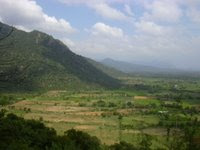
![]() We
made a few excursions to cheer the group and provide them exposure.
First we went exploring some of the villages on the nearby
Chinnakalrayan hills during a day trip. This was a welcome break for
us from routine and helped pull ourselves up a bit.
We
made a few excursions to cheer the group and provide them exposure.
First we went exploring some of the villages on the nearby
Chinnakalrayan hills during a day trip. This was a welcome break for
us from routine and helped pull ourselves up a bit.
Later we went to Bangalo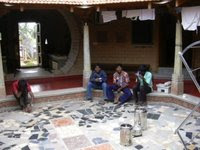 re
for a three day trip. The objective was to fix our old computers that
were not functioning properly. We opened them up to learn about some
basics of the hardware before going to Bangalore. There friends of
ours helped to fix some of the troubles and helped us to go shopping
for some spares. This has now lead to Mahaboob Subhan visiting to
spend a month teaching basics of Computers to our students. Mahaboob
Subhan, 22 years old, studied at the Learning Centre run at Timbaktu
in Andhra and is learning computer hardware and software.
re
for a three day trip. The objective was to fix our old computers that
were not functioning properly. We opened them up to learn about some
basics of the hardware before going to Bangalore. There friends of
ours helped to fix some of the troubles and helped us to go shopping
for some spares. This has now lead to Mahaboob Subhan visiting to
spend a month teaching basics of Computers to our students. Mahaboob
Subhan, 22 years old, studied at the Learning Centre run at Timbaktu
in Andhra and is learning computer hardware and software.
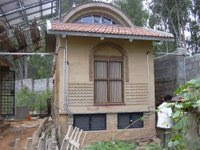 We
also visited a house in Bangalore that has been built using
alternative technology and is experimenting with alternative sources
of energy. It was an interesting visit and we could get exposure to
many different technologies in one place.
We
also visited a house in Bangalore that has been built using
alternative technology and is experimenting with alternative sources
of energy. It was an interesting visit and we could get exposure to
many different technologies in one place.
![]()
Follow up workshop on bee keeping
We had been having a bad
spell with our bee colonies too and so we invited Justin and
Rajendran from Keystone , Kothagiri to conduct a follow up workshop
and help us with some of our practical difficulties. Analyzing our
efforts and finding out where we were wrong and interacting with them
helped raise our spirits . We now have three colonies in and around
Thulir.
Update on Basic Technology Course:
“It was a truly great experience.
Vazhathottam is located in the Sigur plateau next to the Mudumalai
wildlife sanctuary and staying in such a place was a bonus. We went
for walks into the forest nearby and spotted Malabar squirrels, wild
dogs, deer etc.
Justin Raj was an excellent teacher and the boys had more than enough opportunities to work on many bee boxes each at a different stages of development and honey production, presenting one with its own unique problem. We were particularly happy that Sreyarth [our 9 yr old son] was completely involved in the training, took notes diligently, kept a record of the days happenings every night, and handled bees with ease and with interest. He asked us for a Bee box as a birthday gift. Seeing his enthusiasm, Drs. Nandakumar and Shyla at Gudalur, gave him one of their empty bee boxes. We were also very impressed by the dignity and confidence of the tribal boys while handling the bees. They are absolutely quiet and full of concentration . They do not flinch or move even an eyelid when they get stung. And to think that none of the boys had had any previous experience with the bees!”
Once they came back, there was much enthusiasm and almost every day they would be off early morning or later in the afternoons to hunt for colonies to capture. Of course , some of the boys got stung . The bees seem to especially like the area around the eyes. Soon we had most of them moving around with swollen eyes and temporarily half blind. Balu, while walking early morning to his family farm spied a bee colony in transit[with his one working eye of course!]. Bees in transit are ideal for capture, as they have voluntarily left their hive to setup a new hive. Balu was not prepared as he didn’t have an empty box or a netted bag which is normally used and had no one to help. Not one to be easily discouraged, Balu found a one foot long piece of bamboo lying by the road side, picked up a piece of waste plastic carry bag, to use as a stopper for the bamboo, neatly gathered the bees and put them into the hollow of the bamboo. Having thus captured the colony, he promptly was at our doorstep at 7 am on a Sunday morning! Very soon we had 7 boxes with new bee colonies. Every body was on a high and every morning we had bees and boys buzzing all around us . The boys kept inspecting the boxes, making sure that no ants were getting to the boxes and that bees were staying put. This went on for a couple of weeks. Then slowly disaster struck. One by one the bee boxes got attacked by worms that feed on the wax and so the bees started dying and the colonies started disappearing. Soon one morning all the boxes were empty leaving us depressed.
So the Basic Technology course students have a classroom/ workspace as well as a new equipment/ tools store. The construction gave an opportunity to learn basic some building skills. The students got to help in doing the thatch roof as well as in making walls of Rammed earth. The theory classes conducted alongside introduced them to measurements, basic drawing of plans, concepts of scaled drawings etc.
Billing of work:
July 28, 2006
We are adding a new wing which will have a class room cum workshop
for the
Basic Technology course, and a store room for the tools
and materials that
would be used by them. The wing will also have
an entrance lobby, where
additional classes can be held. The wing
has been designed in such a way that
we now have a court in the
middle that can be used for large gatherings [100
persons] and
performances.
This has also provided an opportunity for our students to learn
some
construction skills and some of the days in the past couple
of weeks has been
spent working at site and in theory classes on
basics of construction
materials and their properties.
On 11th and 12th July we held a 2 day workshop on Bee Keeping.
Justin and
Rajendran, Staff from Keystone, an NGO specialising in
beekeeping and honey
gathering activity in the Nilgiris, were the
resourse persons. Apart from our
course students, 4 farmers from
the villages around also participated. The
workshop generated a
lot of enthusiasm amongst our students and we also
realised that
given a rich forest area around us, there is a lot of scope
for
serious Bee keeping and honey processing activity.
As a followup 4 of the students from the batch along with Anu and
Sreyarth are
currently visiting Keystone’s field Centre at
Vazhathottam in the Nilgiris to
learn more practical skills in bee
keeping.
More of their visit in the next post after they come back!
Back to Activities
